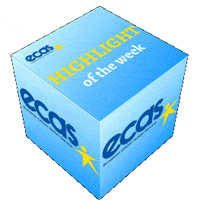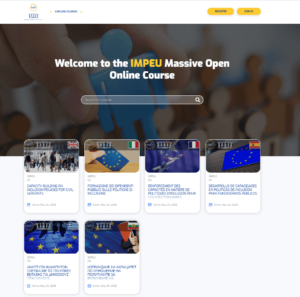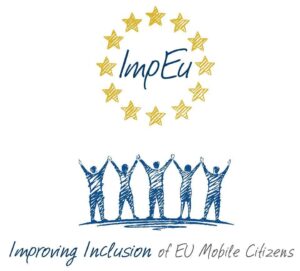

17,5 million Europeans currently live and work in an EU country different from their own. Many of them, however, face serious obstacles when trying to exercise their freedom of movement rights, including voting in European and local elections (political participation). Besides the lack of awareness, a key reason for this is the incorrect interpretation and implementation of the related legislation on a national level.
In response, ECAS and a consortium of partners launched the Improving Inclusion of EU Mobile Citizens (IMPEU) project, with the aim to tackle the issues identified above. Doing so successfully requires targeted training of civil servants and relevant national, regional and local experts – by enhancing their knowledge on EU citizenship and related political rights, they will be better enabled to understand, and therefore serve, the EU mobile citizens in their country.
 This is why in this edition of ECAS’s Highlight of the Week, we are excited to announce that the IMPEU Massive Open Online Course (MOOC) is now live! Based on a needs assessment, the online training module combines theory with practice, including the fundamental theoretical aspects regarding EU mobile citizens’ rights that are connected with their integration in the host societies. Civil servants and EU mobile citizens can freely access engaging, high-quality courses that are interactive and that contain videos, quizzes, resources and much more. All lessons are available in English, Spanish, French, Italian, Greek and Bulgarian.
This is why in this edition of ECAS’s Highlight of the Week, we are excited to announce that the IMPEU Massive Open Online Course (MOOC) is now live! Based on a needs assessment, the online training module combines theory with practice, including the fundamental theoretical aspects regarding EU mobile citizens’ rights that are connected with their integration in the host societies. Civil servants and EU mobile citizens can freely access engaging, high-quality courses that are interactive and that contain videos, quizzes, resources and much more. All lessons are available in English, Spanish, French, Italian, Greek and Bulgarian.
The modules include:
Module 1: Obstacles of EU citizens claiming their citizenship rights
Module 1 offers insight into the main barriers and obstacles that newcomers from other EU countries face when moving into another EU Member State. Specific attention is given to the obstacles that are connected with the right to Free movement, the Social rights and right to political participation. Moreover, the module proposes some solutions to the mentioned obstacles.
Module 2 – Best Practices on facilitating access to EU citizens’ rights
Module 2 aims to provide more concrete information regarding EU mobile citizens’ political rights, by stressing some statistical data that refer to EU mobile citizens’ political participation. This Module also provides knowledge on identifying the best practices that are related to the political inclusion policies. It also lists some good and bad practices that were actually implemented by some member states and can set a reference point, either for replicate or for avoiding them.
This Module provides also knowledge on the EU services that can be accessed by mobile EU citizens who need help or advice and it can help the civil servants and relevant national, regional and local experts offering services to EU mobile citizens to suggest the appropriate EU service to EU mobile citizens looking for help on their rights.
Module 3 – Q&A “Know Your Rights as European citizen”
Module 3 aims to provide knowledge on EU mobile citizens’ rights that derive from their citizenship status. Module 3 emphasizes on the following topics:
Module 3 aims to equip the civil servants and relevant national, regional and local experts offering services to EU mobile citizens with the legislation background and all the information that is required, so as they will offer their services in the most efficient way.
Module 4 – Civic and political rights of EU citizens living abroad
Module 4 of the training course aims to allow participants acquire the needed information on EU citizens’ civic and political rights. It also provides information on best practices and techniques about fostering EU mobile citizens’ inclusion in the host countries. Module 4 also describes some forms of EU citizens’ engagement in the host countries.
Module 5 – Intercultural Communication
Module 5 of the training course aims to allow participants to foster their understanding about concepts related to the Intercultural communication that is a prerequisite for the effective interaction between the civil servants and experts and the EU mobile citizens. It offers some suggestions aiming to develop better Cross-Cultural Communication Skills and lists the main challenges posed to communication of people with different cultural background.
To access the IMPEU MOOC, visit https://mooc-impeu.eu/.
 IMPEU is implemented by a consortium led by Agenzia per lo Sviluppo dell’Empolese Valdelsa (Italy).
IMPEU is implemented by a consortium led by Agenzia per lo Sviluppo dell’Empolese Valdelsa (Italy).